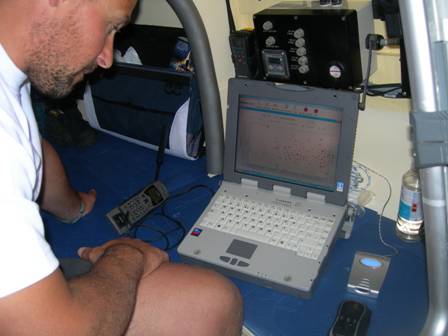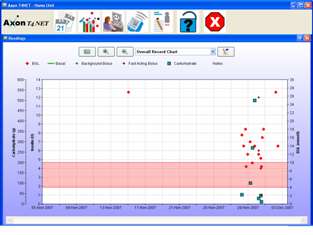| Patient monitoring, information technology |
Transatlantic rower's diabetic challenge10 December 2007 Careful blood glucose management is vital for good diabetes care. Regular testing to ensure that blood sugar levels are within a desired health range are important to avoid long-term complications. These can include amputation, blindness, cardio-vascular disease and even death in extreme cases. Neil, who is pairing with fellow team member Scott McNaughton on the boat Ocean Summit, will be rowing two hours on and two hours off, 24 hours a day, for the whole trip. This will put his body through extreme mental and physical pressures, making the monitoring of his health crucial. Neil has the support of a medical team based in the UK and the latest technology to help make sure he stays healthy. Roche Diagnostics is sponsoring the team and has given Neil their latest all-in-one blood-glucose monitoring system the Accu-Chek Compact Plus, which was only launched in the UK this November. It can be used with one hand and requires few steps to take a reading, making it ideal for use in the difficult conditions on board. Neil said: "As with the millions of other people with diabetes, I've had to rely on a blood glucose meter up to five times a day everyday since I was diagnosed. During the race I will be pushing my body to the absolute extreme and it's likely that my blood sugar levels will fluctuate. Being in the middle of the ocean and being able to rely on a really quick, easy and sturdy system is of 100% importance." Neil will be taking blood glucose reading every 2 hours — 12 times per day and injecting insulin whenever necessary. The blood glucose readings are uploaded to a laptop and relayed to the medical team. Southampton-based Axon has given Neil a military grade GPS laptop PC loaded with the company's T4NET patient monitoring software, which was also launched in November. Neil uploads the data from the glucose meter into the laptop and manually types his insulin values into the system's diary. The system then gives him a graphical result of his readings.
Neil's vital-sign data plus email messages are sent from the laptop via satellite phone to an Axon fileserver in Southampton. His medical team can then view the data, answer his questions and fine tune his glucose levels by suggesting changes to his diet and/or insulin injections.
The medical team at the Royal Bournemouth and Christchurch Hospital
are monitoring Neil's results along with Dr Ian Gallen, a specialist
sports diabetic expert. Dr Gallen advised Olympic gold medallist Sir
Steven Redgrave and helped him continue competitive rowing after being
diagnosed with diabetes in 1997. Neil Hunter and Scott McNaughton are financing the race themselves so that all the sponsorship money given to the team will go to the charity Diabetes UK. The team patron is Richard Lane OBE who was the first person to be successfully treated with islet cell transplantations, which enabled him to come off insulin after more than 30 years of injections. For more information on the team and sponsorship see: www.2menpulling.co.uk/501.html |

